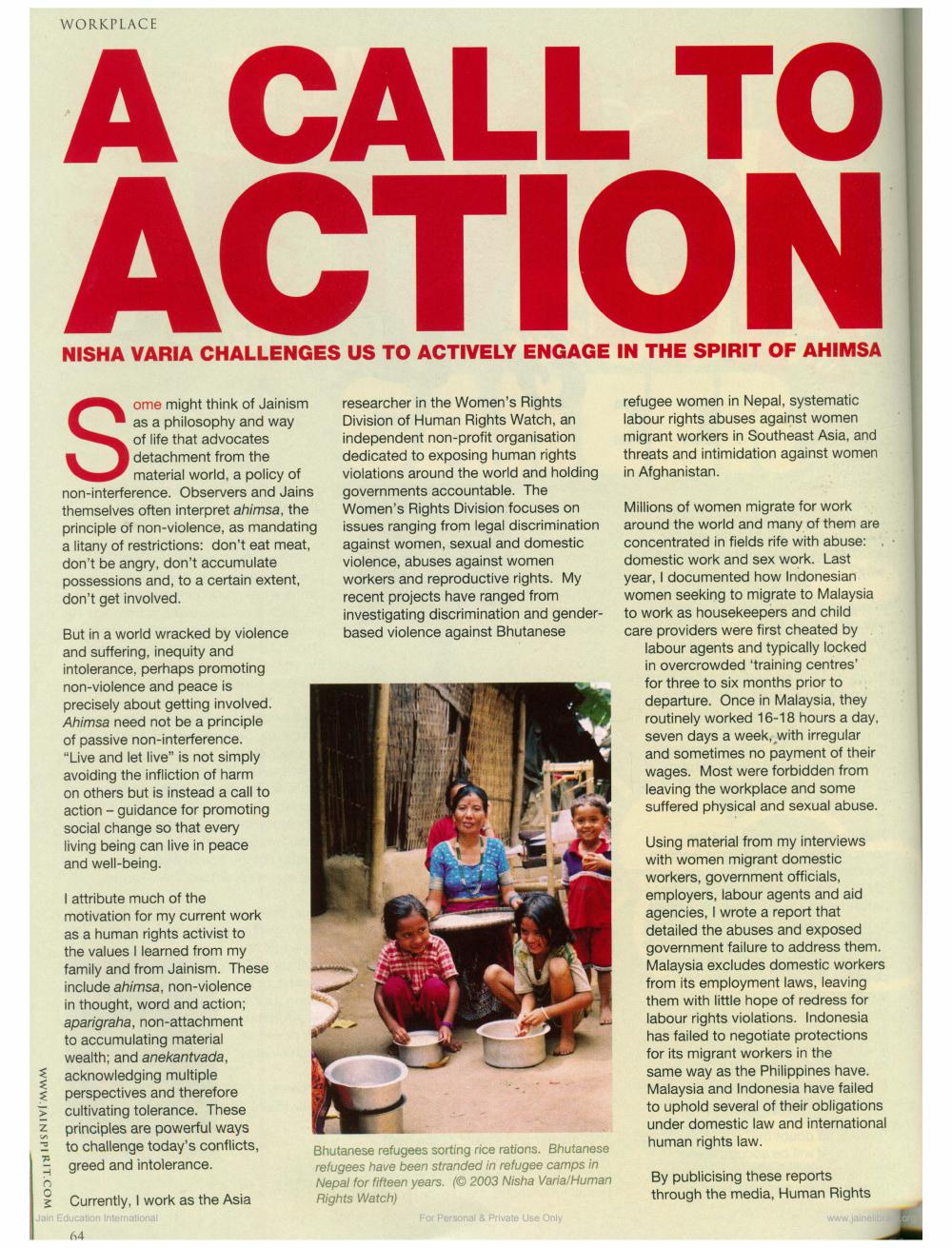Book Title: Jain Spirit 2005 09 No23
Author(s): Jain Spirit UK
Publisher: UK Young Jains
View full book text
________________
WORKPLACE
ACATION
NISHA VARIA CHALLENGES US TO ACTIVELY ENGAGE IN THE SPIRIT OF AHIMSA
refugee women in Nepal, systematic labour rights abuses against women migrant workers in Southeast Asia, and threats and intimidation against women in Afghanistan.
ome might think of Jainism as a philosophy and way of life that advocates detachment from the
material world, a policy of non-interference. Observers and Jains themselves often interpret ahimsa, the principle of non-violence, as mandating a litany of restrictions: don't eat meat, don't be angry, don't accumulate possessions and, to a certain extent, don't get involved.
researcher in the Women's Rights Division of Human Rights Watch, an independent non-profit organisation dedicated to exposing human rights violations around the world and holding governments accountable. The Women's Rights Division focuses on issues ranging from legal discrimination against women, sexual and domestic violence, abuses against women workers and reproductive rights. My recent projects have ranged from investigating discrimination and genderbased violence against Bhutanese
But in a world wracked by violence and suffering, inequity and intolerance, perhaps promoting non-violence and peace is precisely about getting involved. Ahimsa need not be a principle of passive non-interference. "Live and let live" is not simply avoiding the infliction of harm on others but is instead a call to action - guidance for promoting social change so that every living being can live in peace and well-being.
Millions of women migrate for work around the world and many of them are concentrated in fields rife with abuse: domestic work and sex work. Last year, I documented how Indonesian women seeking to migrate to Malaysia to work as housekeepers and child care providers were first cheated by
labour agents and typically locked in overcrowded training centres for three to six months prior to departure. Once in Malaysia, they routinely worked 16-18 hours a day, seven days a week, with irregular and sometimes no payment of their wages. Most were forbidden from leaving the workplace and some suffered physical and sexual abuse.
I attribute much of the motivation for my current work as a human rights activist to the values I learned from my family and from Jainism. These include ahimsa, non-violence in thought, word and action; aparigraha, non-attachment to accumulating material wealth; and anekantvada, acknowledging multiple perspectives and therefore cultivating tolerance. These principles are powerful ways to challenge today's conflicts, greed and intolerance.
Using material from my interviews with women migrant domestic workers, government officials, employers, labour agents and aid agencies, I wrote a report that detailed the abuses and exposed government failure to address them. Malaysia excludes domestic workers from its employment laws, leaving them with little hope of redress for labour rights violations. Indonesia has failed to negotiate protections for its migrant workers in the same way as the Philippines have. Malaysia and Indonesia have failed to uphold several of their obligations under domestic law and international human rights law,
WWW.JAINSPIRIT.COM
Bhutanese refugees sorting rice rations. Bhutanese refugees have been stranded in refugee camps in Nepal for fifteen years. (© 2003 Nisha Varia/Human Rights Watch)
For Personal & Private Use Only
By publicising these reports through the media, Human Rights
Currently, I work as the Asia Jain Education International
www.jana
64

Page Navigation
1 ... 64 65 66 67 68 69 70 71 72 73 74 75 76 77 78 79 80 81 82 83 84 85 86 87 88 89 90 91 92 93 94
